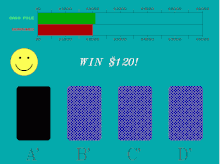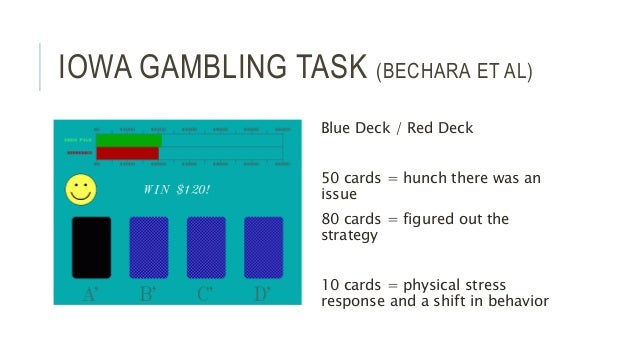In order to detect and measure in the laboratory the decision-making impairment of VM lesion patients, we developed a gambling task which resembles the decisions made in real life in terms of reward, punishment and the uncertainty of outcomes (Bechara et al., 1994). The task involves four decks of cards, called A, B, C and D. Enjoy the videos and music you love, upload original content, and share it all with friends, family, and the world on YouTube.
Bechara’s Gambling Task is more popularly known as Iowa Gambling Task (IGT) which was studied by Antoine Bechara, Antonio Damasio, Hanna Damasio, and Steven Anderson, researchers from the University of Iowa. In this psychological task, the participants’ decision-making skills were observed as they played a virtual card game. Four decks were presented and each one had cards that could give rewards or penalties through game money. Some decks were “good” in the sense that they tend to give more rewards and some were “bad” since they held more penalizing cards. The findings showed that most participants become fairly good at consistently choosing “good decks” after 40 to 50 selections. However, the participants with orbitofrontal cortex (OFC) dysfunction still continued to select the bad decks. Also, unlike their healthy counterparts, the patients with OFC did not show stress reactions in response to losing a lot of game money caused by choosing the bad decks.

The Iowa gambling task is a psychological task thought to simulate real-life decision-making.It was introduced by Bechara, Damasio, Tranel and Anderson (1994), then researchers at the University of Iowa. It has been brought to popular attention by Antonio Damasio, proponent of the Somatic Marker Hypothesis and author of Descartes' Error. The task is sometimes known as Bechara's Gambling Task, and is widely used in research of cognition and emotion.
Participants are presented with 4 virtual decks of cards on a computer screen. They are told that each time they choose a card they will win some game money. Every so often, however, when they choose a card they will win money, but will also lose some money too. The goal of the game is to win as much money as possible. Every card drawn will earn the participant a reward ($100 for Decks A and B; $50 for Decks C and D). Occasionally, a card will also have a penalty (A and B have an total penalty of $1250 for every ten cards; C and D have a total penalty of $250 for every ten cards). Thus, A and B are 'bad decks', and C and D are 'good decks', because Decks A or B will lead to losses over the long run, and Decks C or D will lead to gains. Deck A differs from B and Deck C differs from D in the number of trials over which the losses are distributed: A and C have five smaller loss cards for every ten cards; B and D have one larger loss card for every ten cards.
Most healthy participants sample cards from each deck, and after about 40 or 50 selections are fairly good at sticking to the good decks. Patients with orbitofrontal cortex (OFC) dysfunction, however, continue to perseverate with the bad decks, sometimes even though they know that they are losing money overall. Concurrent measurement of galvanic skin response shows that healthy participants show a 'stress' reaction to hovering over the bad decks after only 10 trials, long before conscious sensation that the decks are bad. By contrast, patients with OFC dysfunction never develop this physiological reaction to impending punishment. Bechara and his colleagues explain this in terms of the somatic marker hypothesis. The Iowa gambling task is currently being used by a number of research groups using fMRI to investigate which brain regions are activated by the task in healthy volunteers as well as clinical groups with conditions such as schizophrenia and obsessive compulsive disorder.
References[edit | edit source]
Bechara A, Damasio AR, Damasio H, Anderson SW (1994). Insensitivity to future consequences following damage to human prefrontal cortex. Cognition, 50: 7-15.
Assessment | Biopsychology | Comparative |Cognitive | Developmental | Language | Individual differences |Personality | Philosophy | Social |
Methods | Statistics |Clinical | Educational | Industrial |Professional items |World psychology |

Cognitive Psychology:Attention · Decision making ·Learning · Judgement ·Memory · Motivation · Perception · Reasoning ·Thinking -Cognitive processesCognition -OutlineIndex

External links[edit | edit source]

A free implementation of the Iowa Gambling task is available as part of the PEBL Project[1]
Bechara 1994 Iowa Gambling Task
| This page uses Creative Commons Licensed content from Wikipedia (view authors). |

Bechara Gambling Task Meaning




